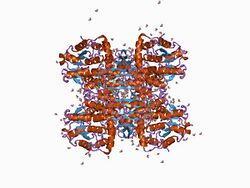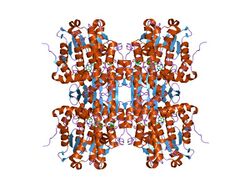Biology:S-adenosyl-L-homocysteine hydrolase
| S-adenosyl-L-homocysteine hydrolase | |||||||||||
|---|---|---|---|---|---|---|---|---|---|---|---|
 Structure of S-adenosylhomocysteine hydrolase from rat liver.[1] | |||||||||||
| Identifiers | |||||||||||
| Symbol | Ad_hcy_hydrolase | ||||||||||
| Pfam | PF05221 | ||||||||||
| InterPro | IPR000043 | ||||||||||
| PROSITE | PDOC00603 | ||||||||||
| SCOP2 | 1b3r / SCOPe / SUPFAM | ||||||||||
| |||||||||||
| AdoHcyase NAD-binding domain | |||||||||
|---|---|---|---|---|---|---|---|---|---|
 d244e mutant s-adenosylhomocysteine hydrolase refined with noncrystallographic restraints | |||||||||
| Identifiers | |||||||||
| Symbol | AdoHcyase_NAD | ||||||||
| Pfam | PF00670 | ||||||||
| Pfam clan | CL0063 | ||||||||
| InterPro | IPR015878 | ||||||||
| PROSITE | PDOC00603 | ||||||||
| SCOP2 | 1b3r / SCOPe / SUPFAM | ||||||||
| |||||||||
S-adenosyl-L-homocysteine hydrolase (EC 3.3.1.1) (AdoHcyase) is an enzyme of the activated methyl cycle, responsible for the reversible hydration of S-adenosyl-L-homocysteine into adenosine and homocysteine.
AdoHcyase is a ubiquitous enzyme which binds and requires NAD+ as a cofactor. AdoHcyase is a highly conserved protein[2] of about 430 to 470 amino acids. The family contains a glycine-rich region in the central part of AdoHcyase; a region thought to be involved in NAD-binding.
AdoHcyase is significantly associated with adenosine deaminase deficiency, which classically manifests in severe combine immunodeficiency (SCID). Accumulated adenosine derivatives, dATPs, irreversibly bind to and inhibit AdoHcyase, promoting the buildup of S-adenosyl-L-homocystine (due to equilibrium constant favors S-adenosyl-L-homocystine), a potent inhibitor of methyl transfer reactions.[3]
This protein may use the morpheein model of allosteric regulation.[4]
References
- ↑ "Crystal structure of S-adenosylhomocysteine hydrolase from rat liver". Biochemistry 38 (26): 8323–33. June 1999. doi:10.1021/bi990332k. PMID 10387078.
- ↑ "Mutational and nucleotide sequence analysis of S-adenosyl-L-homocysteine hydrolase from Rhodobacter capsulatus". Proc. Natl. Acad. Sci. U.S.A. 89 (14): 6328–6332. 1992. doi:10.1073/pnas.89.14.6328. PMID 1631127. Bibcode: 1992PNAS...89.6328S.
- ↑ Hershfield, M S (1979). "In vivo inactivation of erythrocyte S-adenosylhomocysteine hydrolase by 2'-deoxyadenosine in adenosine deaminase-deficient patients". J Clin Invest 63 (4): 807–811. doi:10.1172/JCI109367. PMID 312296.
- ↑ T. Selwood; E. K. Jaffe. (2011). "Dynamic dissociating homo-oligomers and the control of protein function.". Arch. Biochem. Biophys. 519 (2): 131–43. doi:10.1016/j.abb.2011.11.020. PMID 22182754.
 |

